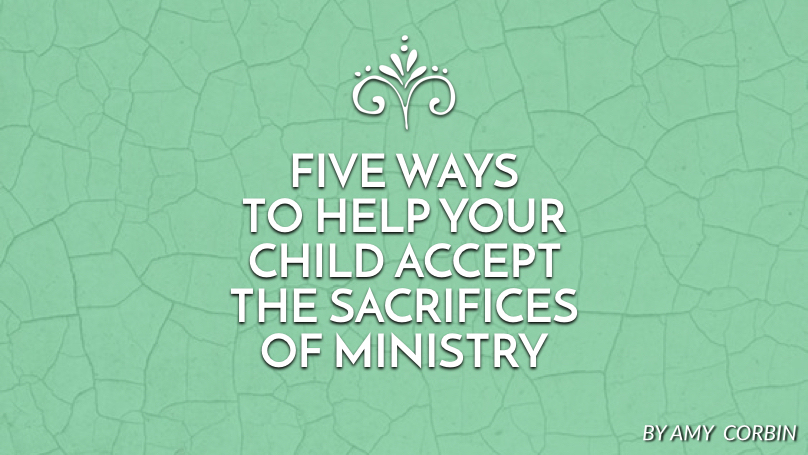When our family moved from Texas to the Pacific Northwest 10 years ago to be church planters, we felt prepared for the sacrifice and costs that would come our way. My husband and I had been in ministry for several years and had already stepped out in faith several times; we knew some sacrifice and cost would be involved. But we quickly realized that sacrifices would not only be asked of us but of our children as well, and that pill was much more difficult to swallow.
My immediate response was to fix it. I didn’t want my children to have to wrestle through sacrifice so young. But I quickly realized “fixing it” wasn’t an option. The best thing I could do was recognize the costs they were experiencing so we could process it together in a God-honoring, emotionally healthy manner.
Some of the things my daughters sacrificed were related to geography; they were so far away from friends and family. They missed family gatherings and celebrations, and that was hard. They left behind wonderful friends who shared their beliefs and morals and were thrown into a world that looked completely different. Our girls currently attend public schools in Vancouver, BC. While we absolutely love our schools and have so many good things to say about them, the reality is my girls haven’t met a single Christian in the hallways. To try and help them through that season, I’d buy devotional books for teen girls. Sadly, the devotional books would only emphasize things like the need for surrounding yourself with Christian friends, and that simply isn’t an option for them.
My girls also experienced sacrifice when it came to privacy and having their own space. When we moved, our home immediately became the church, the office, the fellowship hall, the children’s and preschool area, etc. My girls had to learn the meaning of sacrifice the minute we moved. We had people in our home constantly; the lack of privacy was deeply felt.
They have also experienced sacrifice of things and opportunities. As church planters, we live on a “missionary salary.” Our needs are always met but there is very rarely—if ever—room for extra. We have an incredibly full life and are extremely thankful for all God has given us. But the reality is, our kids do without quite a bit. We don’t go on vacations like their friends do, and we don’t have the nice things that many others do. We learn to live with less which honestly is a great but hard lesson to learn. We have also learned that they miss out on opportunities their “old” friends have. Because of social media, they see their friends having church, school and extra-curricular experiences they never will because of our calling.
I know that these things are not essentials. Our lives are not in danger and, compared to other countries and regions, we have so much. But the sacrifices felt by my children is something I can’t help but recognize. I know that it is hard for them to see others doing things we don’t get to because we have chosen to follow Jesus. But I cannot simply recognize it. I need to respond biblically to their sacrifices and feelings. And while we have not perfected this by any means, let me share a few ways we have learned to process this along the way.
1. We allow our children to feel the pain of sacrifices.
In his book, Inside Out, Dr. Larry Crabb explains sacrifice and the feelings that follow so well.
“Biblical change never requires us to pretend that things are better than they are. Christ wants us to face reality as it is, including all the fears, hurts, resentments and self-protective motives we work hard to keep out of sight, and emerge as changed people. Not pretenders. Not perfect. But more able to deeply love because we’re more aware of His live.”
Ultimately, I want my daughters to be changed for His glory by our church planting journey. I know that cannot happen if we pretend everything is perfect along the way. We allow space to feel disappointment, pain and longing so that we can see our need for God in a way that will never be satisfied on this earth.
2. We learn to thrive by following the example of others.
We read the Psalms together and talk about David crying out to God. We read scripture passages about the men and women who experienced the cost of following Jesus, and we talk about their responses in those situations. We also read books about other missionaries and the struggles they faced. Because our three children are daughters, we talk about women like Amy Carmichael, Helen Roseveare, Katie Davis and so many more who share openly about the suffering and sacrifice as well as unbelievable joy they experienced in following Jesus.
3. We are intentional about watching for God at work.
Our human nature is tempted to always focus on what is wrong or what God is not doing. So, my daughters and I talk about where we see God working. It can be little things like a new friendship, a teacher that is a blessing or a gift card that allows us to eat out. God works in bigger ways, too, like a friend coming to know Jesus or God providing unexpectedly.
4. We celebrate (big) whenever possible.
We have learned that one of the greatest remedies to sacrifice is learning to celebrate the little things. I’m not talking about pretending things are not hard or minimizing what is happening but rather genuinely learning to celebrate what God is doing. When someone comes to know the Lord, we celebrate! When God provides an unexpected opportunity, we celebrate! It reminds us that God is indeed good and His desires for us is to find joy in Him … even in the midst of harder times.
5. We guard against the victim mentality.
I am convinced that one of Satan’s greatest schemes is convincing us we are victims and that God has abandoned us. We talk constantly about this in our home, and our girls know that no matter what life holds, God has already won! We are not victims. We will experience loss, sacrifice and suffering but we can rest in knowing these battles have already been won.
Published May 25, 2017



